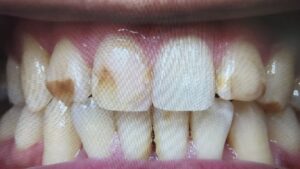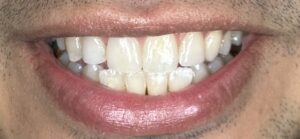Limitations of Tooth Bonding Techniques
Tooth bonding is a popular dental procedure known for its affordability and versatility. It’s a cosmetic solution that can repair and enhance the appearance of your teeth.


However, like any medical procedure, it has its limitations. Understanding these drawbacks is crucial for making an informed decision about dental care.
In this article, we delve into the disadvantages of tooth bonding. We’ll explore its durability, susceptibility to staining, lifespan, and more.
Whether you’re considering tooth bonding or simply curious about dental procedures, this guide will provide a balanced view of its potential limitations.
Understanding Tooth Bonding
Tooth bonding, or dental bonding, is a cosmetic dentistry procedure that involves applying a tooth-colored resin to the teeth. The resin is then shaped, hardened, and polished to match the surrounding teeth.
The procedure is often used to repair chipped or cracked teeth, improve the appearance of discolored teeth, or close gaps between teeth. It can also change the shape or length of teeth, providing a more pleasing aesthetic.
Despite its versatility, tooth bonding is not a one-size-fits-all solution. It is not always suitable for large cosmetic changes or teeth that require significant structural repair.
Understanding the process and its limitations can help you decide if tooth bonding is the right choice. I’d like to point out that discussing all options with your dentist is essential to making an informed decision.
Disadvantages of Tooth Bonding
While tooth bonding is a popular choice for minor cosmetic changes, it has limitations. One main disadvantage is its durability.
The bonding material is less intense than natural teeth or other therapeutic options, such as crowns or veneers. This can lead to issues with longevity and durability.
Durability Concerns
Bonded teeth are less durable than natural teeth. The bonding material can chip or break, necessitating additional visits to the dentist for repairs.
This lack of durability can concern patients who grind their teeth or have a misaligned bite. The bonding material has limited resistance to pressure, which can lead to damage over time.
Susceptibility to Staining
Another disadvantage of tooth bonding is its susceptibility to staining. Compared to other dental treatments, bonded teeth are more susceptible to staining and discoloration over time.
This can concern smokers or individuals who consume a lot of coffee, tea, or red wine. These substances can stain the bonding material, producing a less-than-ideal aesthetic result.
Lifespan and Longevity
Dental bonding typically has a shorter lifespan than other procedures. It often requires replacement or repair within 3 to 10 years.
This can lead to additional costs and time spent at the dentist, so it’s important to factor this into your decision when considering tooth bonding.
Aesthetic Limitations and Predictability
The aesthetic results of tooth bonding can be less predictable than with veneers or crowns. This is because it relies heavily on the dentist’s skill.
Bonding materials may not perfectly match the natural tooth color. This can significantly lead to a mismatched appearance if the natural teeth change color over time.
Not Suitable for All Dental Issues
Tooth bonding is not always suitable for large cosmetic changes or teeth requiring significant structural repair. It’s also not the best choice for teeth under high stress, such as molars.
In these cases, other restorative or cosmetic procedures may be more appropriate. It’s important to discuss these options with your dentist.
Insurance and Cost Considerations
The cost of tooth bonding can be a concern for some patients. While it is less expensive than other cosmetic dental procedures, dental insurance may not cover it if it is considered purely cosmetic.
This can lead to out-of-pocket expenses. Before proceeding with the procedure, discussing this with your dentist and insurance provider is essential.
Maintenance and Oral Hygiene
Proper oral hygiene is essential to maintain the appearance and longevity of bonded teeth. This includes regular brushing, flossing, and professional cleanings.
Failure to maintain good oral hygiene can stain and damage the bonding material, shortening the lifespan of the bonded teeth and causing additional dental issues.
Risk of Damage and Repair
As mentioned earlier, the bonding material can chip or break, requiring additional visits to the dentist for repairs.
The patient’s oral habits can also influence the success of tooth bonding. Biting nails or chewing on complex objects can damage the bonding material and shorten its lifespan.
Choosing the Right Dental Treatment
Choosing the proper dental treatment is a personal decision. It should be based on your specific dental needs and aesthetic goals.
It’s important to discuss all options with your dentist. This includes the pros and cons of tooth bonding and other treatments.
Tooth Bonding vs. Alternatives
Tooth bonding is just one of many cosmetic dental procedures. Alternatives include veneers, crowns, and orthodontics.
Each of these options has its own set of advantages and disadvantages. It’s important to compare these to make an informed decision.
Questions to Ask Your Dentist
Before deciding on tooth bonding, asking your dentist key questions is essential. This can help you understand the procedure and its potential outcomes.
Here are some questions to consider:
- What are the potential risks and complications of tooth bonding?
- How long can I expect the results to last?
- What are the alternatives to tooth bonding?
- How can I maintain the results of tooth bonding?
- What is the cost of tooth bonding, and does insurance cover it?
Extending the Life of Tooth Bonding
Proper oral hygiene is crucial to extend the life of tooth bonding. Regular brushing, flossing, and professional cleanings can help maintain its appearance.
Avoiding nail biting and chewing on complex objects can also prevent damage. Regular dental check-ups are essential to monitor the condition of bonded teeth.
Conclusion: Balancing Pros and Cons
Tooth bonding is a viable option for many dental issues. However, it’s essential to understand its limitations and potential disadvantages.
Informed decisions are key. Please discuss all options with your dentist to ensure tooth bonding is the right choice for your specific needs.
We are passionate about exceptional dental work at Tamborello Dental Associates in Houston, TX. Our years of experience ensure that each patient receives the best care customized to their unique needs and desires!
SCHEDULE A CONSULTATION IN HOUSTON TEXAS
If you’ve ever considered improving your oral health, please look at what we offer. Then, please schedule a consultation with us and experience your smile’s warmth, professionalism, and transformative power. Your journey to a brighter, more confident day begins with a single step. Let’s take it together!
